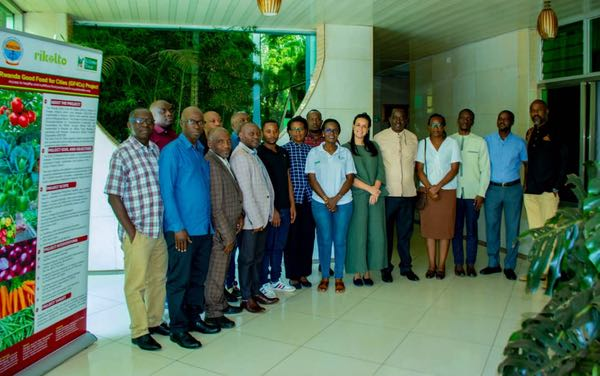
By George Kalisa
The Ministry of Agriculture and Animal Resources (MINAGRI) has today reiterated its commitment to increase food production by ensuring easy accessibility and sustainability.
MINAGRI called on stakeholders and Rwandans in general to ensure that the food supplied on the market is safe for the country to have a healthy population as healthy diets greatly prevent diseases linked to malnutrition.
Illuminee Kamaraba, the Division Manager for Crop Post-Harvest and Processing Management/RAB who represented the ministry made the remarks at the Stakeholders’ Dialogue Meeting on Urban Food Systems Governance in the capital, Kigali.
“As a Ministry we’ve the mandate of increasing food production by ensuring availability of food on the market, and thus regard accessibility and sustainability as important aspects,” observed Kamaraba.
Kamaraba is optimistic that with the apparent multi-sectoral approach adopted by ADECOR and partners concerted efforts the issue of availability, accessibility food safety and will soon be overcome.
She underlined the role of both local and foreign NGOs and the Private Sector Federation (PSF).
“The ministry is not alone to address the issue of availability – we work with NGOs and the Private Sector Federation (PSF),” she added.
World Food Programme (WFP) is strongly committed transforming food systems along the whole value chain,” said Giulia Chiaventi, the Programme Policy Officer at WFP.
On youth empowerment Chiaventi said: “SAMS Unit in particular is working on youth job creation through THE FSC model.
“The innovative approach of the GF4Cs projects is very interesting as urban areas to leave no one behind,” she added.
The CEO of Rwanda Consumer’s Rights Protection Organization (ADECOR), Damien Ndizeye remarked that Food and nutrition is a foundational issue among Rwanda’s priorities for economic development and poverty reduction.
“Food and nutrition have become a foundational issue of Rwanda’s priorities for economic development and poverty reduction. To make the political will of Rwanda Government a reality, many actions have been initiated and continue to be undertaken to sustain this innovative multi-sector and sector-specific strategies to assure that food and nutritional improvement becomes and remains everyone’s commitment in Rwanda,” said Ndizeye during his welcome remarks at the meeting.
“The Government of Rwanda focuses on the national resolve to substantially reduce the prevalence of stunting among children under two years of age, and to improve household food security particularly among the most vulnerable families,” he added.
Ndizeye revealed that substantial reduction of acute malnutrition has occurred in recent years, but there remain problems with high levels of chronic malnutrition and micronutrient deficiency.
He noted that malnutrition of the young children adds permanent risks to their health, growth and cognitive development as well as a loss to their economic productivity over a lifetime. Cumulating these negative effects can result in economic losses.
“When pregnant women do not have appropriate nutritional intake during pregnancy, and children do not receive the foods, feeding and care required for normal growth during their first two years, chronic malnutrition occurs,” he said.
He said that inadequate household food security that affects many of Rwandan families are still the main causes of the high rates of chronic malnutrition in children and other nutrition problems adding that they were problems, which are often complicated by the synergy of nutrition with childhood infections.
“While horticulture is one of the least expensive and most effective nutrition interventions to tackle hidden hunger on a huge scale, preventable deficiencies of critical vitamins and minerals such as vitamins A and D, iron, iodine, folic acid, and zinc, contribute to the occurrence of up to three million child deaths annually.”
The project is sponsored by RIKOLTO SON, Rwanda Consumer’s Rights Protection Organization (ADECOR) while Kilimo Trust Rwanda are implementing the project “Rwanda Good Food for Cities (GF4Cs)/ Imirire myiza iwacu”.
The 5-years initiative (2022-2026) is implemented in RUBAVU district. The project has three domains of interventions: Healthy and nutritious food for cities produced in an efficient and sustainable way (sustainable food production), and Urban food markets are inclusive of smallholder producers, vulnerable citizens, the youth and women (inclusive markets) and
The third is to create an enabling policy, financial and normative environment at local, national and international level incentivizes healthy, sustainable and nutritious diets (enabling environment).
“RICA is thankful to ADECOR because the population in Kigali is increasing yet arable land is decreasing and the projects’ mission will help to check the effects of population pressure in Kigali City.”
Antoinette Mbabazi Head of Department/Registration, Licensing and Enforcement at the Rwanda Inspectorate Competition and Consumer Protection (RICA) made the remarks at the meeting.
“We argue stakeholders to assure Rwandans increased standards, safety of food by aligning their activities right from the farm to the consumers as well as scaling sensitization on rules and regulations put in place by the GoR to ascertain food safety,” she added.
